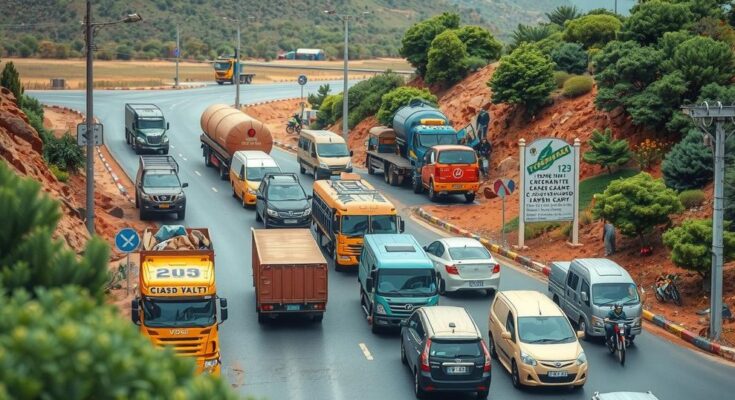The Torkham border crossing between Pakistan and Afghanistan reopened after a month-long closure. Initiated for construction activities by Afghan authorities, the suspension had disrupted significant trade valued at $1.6 billion. Officials confirm the reopening will facilitate trade and travel, while emphasizing the need for separating political conflicts from economic activities.
On Wednesday, the pivotal Torkham border crossing between Pakistan and Afghanistan resumed operations after nearly a month of being closed, as confirmed by officials from both nations, allowing trade activities to recommence. The border had been shut since February 21, when Afghan authorities began constructing trenches and conducting various development projects along the border, leading to a halt in cross-border commerce and movement.
Torkham serves as the primary transit route for both passengers and goods between Pakistan and Afghanistan, which, as of 2024, had trade valued at over $1.6 billion according to statements from Pakistan’s foreign office. Naheed Khan, a senior police official in Pakistan’s Khyber district, stated to Arab News, “The Torkham gate has been reopened for transport.” This reopening has been further substantiated by Hazrat Nabi Toor, an Afghan customs clearing agent, who confirmed the movement of trucks through the reopened border.
Commissioner Hajji Hikmatullah remarked that the reopening would facilitate stranded trucks on either side of the border in reaching their intended destinations. “The Torkham route between Pakistan and Afghanistan that remained closed will reopen today at around 4:00 p.m. while passengers’ movement through the border will start from Friday,” he conveyed, suggesting the importance of establishing a clear separation between politics and business to enhance economic relations between the two neighboring countries.
Asghar Ali, a customs clearing agent in Pakistan, reported that upon the announcement of the reopening, numerous vehicles laden with vegetables, fruits, and other non-perishable goods began to converge on the border. He emphasized, “This border closure inflicted millions of dollars of losses on businessmen. Trade should not suffer in diplomatic and political wars between the two countries.”
Past border conflicts have led to the closing of significant crossings like Torkham and Chaman, critically disrupting both trade and movement of individuals. Notably, the previous month saw the Torkham closure escalate into a skirmish that resulted in injuries to three Pakistani civilians, as per reports from local police officials.
This recent turn of events unfolds against the backdrop of deteriorating relations between Kabul and Islamabad, fueled by a rise in militant activities in Pakistan’s border provinces. Islamabad has persistently accused Afghanistan of harboring militant factions responsible for cross-border assaults, a claim that Afghan officials categorically deny, urging Pakistan to manage its internal security challenges.
The reopening of the Torkham border crossing signifies a crucial step towards restoring trade relations between Pakistan and Afghanistan after nearly a month of closure. With ongoing tensions and allegations concerning security issues, both nations must find common ground to ensure economic collaboration. This reopening not only alleviates logistical issues but highlights the need for both countries to focus on constructive relations, keeping trade unaffected by political disputes.
Original Source: www.arabnews.pk




